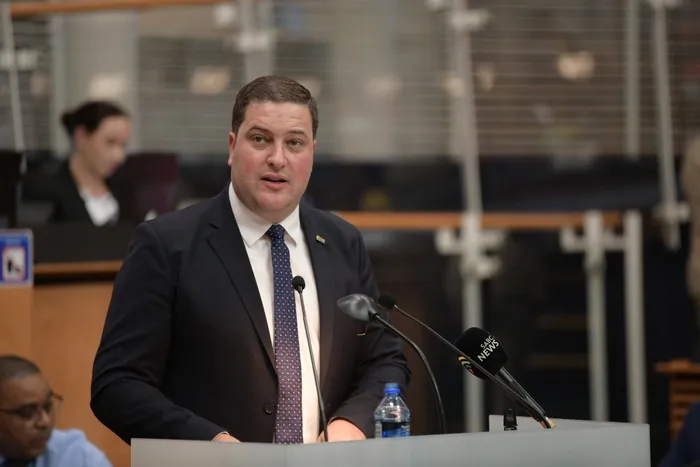
RECEIPTS City of Cape Town Mayor Geordin Hill-Lewis
Image: File
Cape Town Mayor Geordin Hill-Lewis has issued a clarion call to action, emphasising the urgent need to improve conviction rates for gang, gun, and drug crimes in the city, as reflected in the latest Quarterly Crime Statistics. With violent crime rates continuing to take their toll on the most vulnerable communities, the Mayor stresses a multifaceted approach involving immediate resource deployment to tackle this pressing issue.
According to the latest data, gang activity has emerged as a common thread across Cape Town's most affected precincts, which rank among the top 30 stations nationally for murder. Mayor Hill-Lewis pointed to a silver lining in the statistics, noting consecutive declines in murder rates in areas like Nyanga, Philippi East, and Khayelitsha—all regions that benefit from the deployment of Law Enforcement Advancement Programme (LEAP) officers who assist the South African Police Service (SAPS).
“These latest crime stats make it clear that violent crime continues to plague some of our most vulnerable communities. While we do take heart in the decline of murder rates in select areas, it is essential to highlight that police activity in confiscating illegal arms and drugs is not achieving the desired impact due to a dismally low conviction rate,” said Hill-Lewis.
The Mayor highlighted a concerning statistic: despite the removal of over 450 firearms annually from the streets, the current conviction rate stands at a staggering 5%—a clear reflection of the challenges faced by an overburdened criminal justice system, under-resourced SAPS, and the National Prosecuting Authority (NPA).
“The Acting Police Minister has the power to change this situation in various ways, including the urgent resourcing of SAPS and, most immediately, expanding the draft municipal policing power regulations issued by his department earlier this year for public comment,” urged Hill-Lewis. He posits that empowering city officers with enhanced policing capabilities would enable them to build prosecution-ready cases against perpetrators of gang, gun, and drug crime more effectively.
Reflecting on the City’s ongoing commitment to safety, data released in October indicates that while municipal policing resources have soared with the addition of 1,263 new officers since 2021—a 48% increase—SAPS has faced a decline of approximately 1,300 officers, or 15%. Furthermore, Cape Town's municipal fleet boasts 560 more policing vehicles than SAPS, underscoring the urgent need for a collaborative approach to public safety.
“We have made significant investments in community safety, evident in the deployment of LEAP officers and our new Metro Police Neighbourhood Safety Officers (NSOs). Even with considerable arrests made for drug-related offences, the low conviction rates continue to present a barrier to achieving justice,” stated Alderman JP Smith, the City’s Mayoral Committee Member for Safety and Security.
Recent parliamentary replies have unveiled worrying vacancy rates within SAPS, hovering between 20-40% across many Cape Town precincts, exacerbated by the alarming figure of 200 vacant detective posts as of August 2025. This reality, according to Smith, necessitates unprecedented reforms across the criminal justice system, coupled with additional policing powers to ensure effective enforcement against gang violence.
As crime statistics paint a bleak picture, Hill-Lewis has asserted a determined stance: “It truly is a black Friday given these crime stats, but our special offer remains 100% more investigative capacity to help SAPS turn the tables on gang, gun, and drug crime.” With hope for future collaborative efforts, he remains resolute in pushing for the necessary changes to facilitate effective crime resolution.